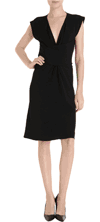Textiles, Merchandising and Fashion Design, Department of

Department of Textiles, Merchandising and Fashion Design: Dissertations, Theses, and Student Research
First Advisor
Jennifer Johnson Jorgensen
Date of this Version
Fall 12-2019
Document Type
Thesis
Abstract
Fashion trend cycles have become increasingly fast-paced and unsustainable due to competition and consumer demand in the apparel sector. Despite having sustainable apparel choices available, consumers seem reluctant to adopt sustainable changes in their consumption habits due in part to the market allure of rapid turnover of goods, better known as ‘Fast Fashion’. Paired with aggressive marketing campaigns that encourage increased consumption beyond need, the apparel industry keeps expanding at alarming rates around the world. Although it has been identified that consumers increasingly care about the unethical behaviors in the industry that negatively impact the environment, this feeling does not successfully translate into modified behavior of more sustainable consumption (McNeill & Moore, 2015). Clothing products remain important in today’s consumer culture, but the sustainability of that consumption is lacking, as it often leads to excess waste. This study was conducted to identify consumer’s behavioral habits of purchase, care, and disposal of apparel in order to advocate a more sustainable consumption that does not worsen the environment’s quality.
A quantitative research method was used to study approximately 400 participants via an online survey. The purchase behaviors, sustainability considerations, and care and apparel disposal of the participants were examined to help determine their current habits, based on the Theory of Planned Behavior. Attitudes, subjective norms, and perceived behavioral control were examined as antecedents of intention with an extrinsic focus on how these variables influence the behaviors of individuals when it pertains to how they handle their clothing.
Advisor: Jennifer Johnson Jorgensen


Comments
A THESIS Presented to the Faculty of The Graduate College at the University of Nebraska In Partial Fulfillment of Requirements For the Degree of Master of Science, Major: Textiles, Merchandising and Fashion Design, Under the supervision of Professor Jennifer Johnson Jorgensen. Lincoln, Nebraska: December, 2019
Copyright 2019 Ana La Rosa